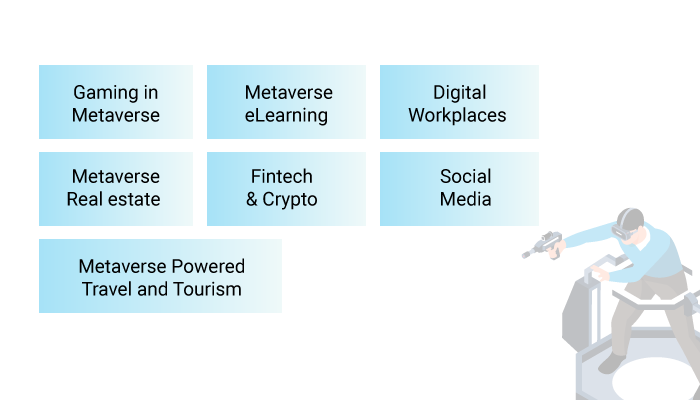Metaverse is the center of attention right now. Coming from one of the largest tech companies, we formerly knew as Facebook, this is something that has the potential to change the world of technology forever.
Worth more than $38.5 Billion already, Metaverse is booming. It attracts more than 400 million active users per month and this is a figure that has been growing continuously.
This virtual world has almost become a trend, as more than 74% of American adults are either already joining Metaverse or planning to do so.
In fact, it is expected that by the year 2026, more than 25% of the entire population will be spending at least one hour on Metaverse per day. Yes, it’s that great.
While this technology is super popular and widely used, there are a lot of questions, doubts, confusion, and most important curiosity around Metaverse.
People want to know, what are the Metaverse use cases, how can you apply it in your business, what are the benefits, and so on. In this blog, we shall be discussing all of it and more.
Metaverse Explained
Just like Artificial Intelligence, AR, VR, Robotics, and many other technologies, Metaverse too has its origins in Sci-Fi (as most of you already might have guessed).
Neal Stephenson’s Sci-Fi Novel “Snow Crash”, Ready Player One by Ernest Cline, Neuromancer by William Gibson, and not to forget the famous “Matrix” Firms. These are just a few names that inspired the concept of metaverse technology.
Metaverse definition says it is a three-dimensional web-based virtual space that can be accessed through technologies like Augmented reality and Virtual Reality. There are several other technologies and elements interwoven with it like NFTs, IoT, Digital items, and so on.
Still confused? Well, in layman’s terms, this is a digital world that you can see and interact with using visual and auditory technologies like VR glasses, or AR-compatible technologies like smartphones, tablets, and so on.
What makes it different, like other virtual space technologies that came before it is, the Metaverse application integrates with the world, creating a hybrid space. Meaning you can use your real space, for instance, your bedroom and use it to make a virtual space.
This allows you to walk around in that virtual space, interacting it with as if you were teleported into a game. TRON movie is a good example of this.
Now, the reason behind massive Metaverse use and it’s becoming a trend is, it opens door to infinite new technologies. You can hold meetings, share space with your friends even though they are in four different corners of the world, or even buy land in the metaverse.
But what does metaverse means for businesses? Let’s answer this question in the section below.
What Does Metaverse Mean for Businesses?

Metaverse tech is the next step in the evolution of technology.
It is the key to creating another world within ours. And this opens a door to endless opportunities that can help businesses, rise to a level that wasn’t possible before.
- A virtual world as big as the real one or even larger and billions of people interacting with it opens up never-before-seen opportunities for advertisement and promotion.
- This is will take remote working to next level by creating virtual workplaces, and improving collaboration and productivity.
- Metaverse tech will take, eWallet app usage to a whole new level, creating a virtual retail space.
- Creating an opportunity for user interaction that never existed before, as businesses can meet clients in a virtual space that overshadows video conferences.
- Allows customers to shop like they are at a physical store and boost revenue by many folds.
These are just some of the ways how Metaverse is changing the business world. And with the several metaverses use cases or metaverse business use cases to be specific, more and more companies are looking to invest in it.
In less than a decade billions of people will use metaverse daily. This means this technology will integrate with anything and everything.
So, if you are more curious about the use cases of metaverse, we will be discussing all that in the section below:
Metaverse Uses cases in Various Industries: How it’s transforming the real world.

One of the first questions people ask when you mention metaverse meaning is, “what are the metaverse use cases?”
There are infinite things you can do in this virtual space but there are some specific industries that benefit from more metaverse than others. Therefore, here, we shall be discussing some of the top metaverse applications in detail.
1. Gaming in Metaverse
The first thing that comes to mind when someone mentions metaverse use cases is gaming industry. VR and AR games are the foremost and largest application of Metaverse. In fact, this was the selling point to most of the investors when the metaverse first came in limelight.
And let us tell you, with the experience these games offer, the metaverse game industry is exploding. Games like Sorare, Axie Infinity, and sandbox are leading the metaverse gaming scene. Axie infinity alone has more than 350,000 average active daily users with monthly users rising to 3 million.
But why gaming? Well, the metaverse technology allows players from different locations to interact with each other and join gameplay in the very same interoperable environment. In simple words, it feels like they are in the same play, and they are (virtually).
Apart from this, metaverse also allows the creators to provide a life-like social environment, this is the main difference between a VR game and a metaverse game.
Moreover, metaverse uses in-game NFT assets with specified permanent ownership, rewarding players heftily and keeping their assets secure. Not to mention the great compatibility this environment has with cryptocurrency.
2. Metaverse Powered Travel and Tourism
Travel and tourism are one of the world’s largest industries worth trillions of dollars. And today, you can book a flight to almost any corner of the world.
But there are certain problems with our current travel industry. For starters, it was really expensive. If you want to travel to a prime location like the USA, you are looking towards spending 10s of thousands of dollars. And the second one – while not a problem with the travel industry, this is something a lot of tourists suffer with – it takes a lot of time.
This is where Metaverse comes in. Being one of the most innovative and interesting use cases of the metaverse. That’s why the world’s largest travel agencies like Thomas cook have already started investing in Metaverse-powered applications in the form of “try before you fly”.
Let us tell you how it works.
Imagine this, you are wearing a VR headset and it takes you on a world tour. From the highest point a man has been to, Mount Everest, or maybe even the moon, to the deepest point on the earth, the marine trends. You can visit all of it sitting in your room.
If you are a travel and tourism business, you can integrate metaverse functionality into your existing travel app or create an entirely new metaverse-powered travel app.
In any case, this is the most innovative metaverse use cases. And with this out of the way, let’s move to the next one.
3. Metaverse eLearning
eLearning started a long time ago. But it wasn’t until covid-19 induced pandemic, that the real value and potential of online learning solutions were realized.
Apps like Meet and Zoom are good at what they do, but there’s something much better. And this is where good at what they did, but metaverse in elearning is a whole new thing.
In fact, by combining metaverse’s virtual world with elearning, you get literal virtual universities where the number of students isn’t limited. And people don’t need to travel to their college.
In addition, students get amazing quality education and resources at their disposal. This is something that has already started.
Microsoft has created a platform known as Mesh. Here, students as well as teaching staff can create their own 3D avatars and interact with each other on the platform.
This takes eLearning solutions to whole another level. Making it one of the best uses of the metaverse.
4. Digital Workplaces
Work from Home is the word that every employee loves. And something that most employers frown upon.
Jokes apart, remote working has really become a thing after the introduction of all modern technologies. Some of the world’s top companies including Google, Amazon, and Facebook allow their employee to work remotely.
The issue is, a lot of workplaces report issues with remote working as it lacks collaboration and may hamper productivity. Well, maybe true may not be. But the big point is, with metaverse use cases, now, you can create digital workplaces.
Employees in different locations can collaborate via metaverse. In fact, this is one of the top metaverse B2B use cases as it can also be used for business meetings and whatnot.
5. Metaverse Real estate
Well, well, this is one of the largest metaverse use cases.
It’s mentioned time and time again that Metaverse is a literal virtual world. And thus, metaverse real estate is also equally real, meaning you can buy land in the metaverse. In fact, this industry sits at the core of metaverse tech.
The global Metaverse in the Real Estate market was valued at USD 821.9 million in 2021 and is projected to reach a value of USD 5953.6 Million by 2028 at a CAGR of 39.10% over the forecast period. Making real estate the most profitable industry within the metaverse.
Considering the fact that realtors don’t have to travel to the site nor do the potential customers, making it such a big hit in the real world.
6. Fintech & Crypto
Metaverse use cases in the financial world are often overlooked. But this is something that you should pay attention to.
Even before metaverse was introduced, we already got our totally virtual applications. And fintech app usage has increased greatly.
However, with metaverse use cases in banking, all of them can be improved by many folds. And this is the reason why a lot of big banks are investing huge sums of money in metaverse NFTs and other such technologies.
Not to mention the fact that metaverse technology is highly compatible with cryptocurrencies and blockchain in general. Making it one of the top
7. Social Media
The Metaverse can also transform social media by creating a more immersive and interactive experience.
Instead of scrolling through a feed of text and images, users can enter a virtual space where they can interact with each other in real time.
This can lead to new forms of social media, such as virtual concerts and events that allow people to connect with each other in a more meaningful way.
While this is not the greatest industrial metaverse use case, this is something that can revolute social media app development.
So, these were some of the popular metaverse use cases and applications of a metaverse in different industries. And with this out of the way, let’s look at some of the top technologies that go behind
Technologies Behind Metaverse
Now that you know what metaverse is, you must be thinking what goes behind making this platform work. Well, you aren’t the only one. There are a number of metaverse techs. And in this section of the blog, we shall be discussing just that.
Virtual Reality (VR)

Virtual reality is a technology that creates a computer-generated environment that simulates a user’s physical presence in that environment. Users can interact with this environment using specialized hardware and software.
VR is a key technology behind Metaverse because it allows users to immerse themselves in a virtual world and interact with other users as if they were in the same physical location.
Augmented Reality (AR)

Augmented reality is a technology that overlays digital information or objects onto the real world. AR is often used in conjunction with mobile devices, such as smartphones or tablets, to provide users with information about their environment.
Metaverse AR can enhance the virtual world by adding digital objects or information to the user’s physical environment.
Blockchain

Blockchain is a decentralized ledger technology that allows for secure and transparent transactions without the need for intermediaries.
Metaverse use case for blockchain is to create a secure and transparent economy where users can buy, sell, and trade virtual assets. This can include virtual currency, virtual real estate, and other virtual goods.
- Artificial Intelligence (AI)
Artificial intelligence is a technology that enables machines to perform tasks that would normally require human intelligence, such as recognizing speech or understanding natural language.
In Metaverse, AI can be used to create more realistic and immersive virtual environments. For example, AI-powered avatars can interact with users in a more natural and intelligent way.
Examples of The Metaverse application
With metaverse use cases and technologies out of the way, let’s look at some of the examples of the metaverse.
These are, as mentioned below:
- Second Life
Launched in 2003, Second Life is one of the oldest and most well-known metaverse games. Players create avatars and interact with each other in a vast virtual world, where they can own property, attend events, and even start their own businesses.
- Decentraland
Decentraland is a newer metaverse game that operates on blockchain technology. Players can buy, sell, and trade virtual land, as well as create and monetize their own games and experiences.
- Roblox
Though not strictly a metaverse game, Roblox features a vast user-generated virtual world where players can create their own games, experiences, and even virtual items to sell to other players.
- Entropia Universe
Entropia Universe is a sci-fi metaverse game where players can explore different planets, hunt creatures, and even participate in auctions where the real money is used to purchase virtual items.
Benefits of Metaverse for Businesses
Now that you know what are the various use cases and examples of metaverse platforms, you might be wondering what are the benefits of the metaverse. Well, in this blog, we shall be discussing some of the best benefits of metaverse for businesses.
- Increased Engagement
One of the main benefits of the metaverse for businesses is the potential for increased engagement with customers.
By creating virtual spaces where customers can interact with products or services, businesses can provide a more immersive and interactive experience. This can lead to increased brand loyalty and customer satisfaction.
- New Revenue Streams
The metaverse also offers businesses the opportunity to create new revenue streams. For example, companies can sell virtual goods or services within the metaverse, such as virtual real estate or digital experiences.
Moreover, businesses can offer advertising or sponsorship opportunities within virtual spaces, similar to how they might sponsor events in the physical world.
- Global Reach
The metaverse is not limited by physical boundaries, which means that businesses can potentially reach a global audience. This is particularly beneficial for businesses that operate in niche markets or have a limited geographic reach.
By creating a virtual presence in the metaverse, these businesses can expand their reach and connect with customers from all over the world.
- Improved Collaboration
Metaverse has the potential to improve collaboration within businesses. By creating virtual workspaces, employees can collaborate on projects in real-time, regardless of their physical location. This can lead to increased productivity and efficiency within the organization.
So, these are some of the top benefits that come with the various metaverse use cases. And with this out of the way, let’s see how you can use metaverse for your business.
Use Metaverse in Your Business: Top Metaverse Applications
Wondering use of metaverse for your business? let’s see what are some of the top metaverse applications. These are, as mentioned below:
1. Virtual Events and Conferences
With the ongoing pandemic, businesses have had to shift their events and conferences to a virtual format. The Metaverse provides an immersive experience for attendees, allowing them to interact with each other and the environment as if they were in the same physical space. This application can help businesses save costs on venue rentals and travel expenses while still providing a valuable experience for attendees.
2. Virtual Product Showrooms
The Metaverse allows businesses to create virtual showrooms where customers can interact with products in a 3D environment. This application can help businesses showcase their products in a more engaging way and provide customers with a better understanding of the product’s features and benefits.
3. Virtual Training and Education
The Metaverse can be used for virtual training and education, providing an immersive and interactive learning experience. This application can help businesses save costs on physical training facilities and provide employees with a flexible learning experience that can be accessed from anywhere.
4. Virtual Real Estate Tours
The Metaverse can be used to create virtual real estate tours, allowing potential buyers to explore properties in a 3D environment. This application can help real estate businesses save costs on physical tours and provide a more engaging experience for potential buyers.
Conclusion
This blog discusses the concept of the Metaverse and how it is becoming increasingly popular. It explains that Metaverse is a three-dimensional, web-based virtual space that can be accessed through technologies like Augmented Reality and Virtual Reality. The blog also highlights the various benefits that Metaverse technology can offer businesses. These include advertising and promotion, virtual workplaces, e-learning, digital workplaces, metaverse real estate, fintech and crypto, and social media.
FAQs
The metaverse is a collective virtual shared space, created by the convergence of physical and virtual reality. While virtual reality is an immersive experience that allows users to interact with a simulated environment, the metaverse goes beyond that by creating a persistent and interconnected space where users can interact with each other and digital objects in real-time.
Some potential use cases for the metaverse include virtual events, social and gaming experiences, education and training simulations, e-commerce and advertising, and even virtual real estate.
Businesses and organizations can leverage the metaverse by creating immersive experiences that engage with their audience in new and innovative ways, facilitating virtual meetings and events, and exploring new revenue streams through e-commerce and advertising.
Some challenges facing the development of the metaverse include technical limitations, ensuring user privacy and security, regulating virtual economies, and creating a universally accessible and inclusive space.
The future of the metaverse is still uncertain, but many experts predict that it will become an increasingly important part of our digital lives, with the potential to transform the way we socialize, work, and interact with technology.

Niketan Sharma is the CTO of Nimble AppGenie, a prominent website and mobile app development company in the USA that is delivering excellence with a commitment to boosting business growth & maximizing customer satisfaction. He is a highly motivated individual who helps SMEs and startups grow in this dynamic market with the latest technology and innovation.
Table of Contents




No Comments
Comments are closed.